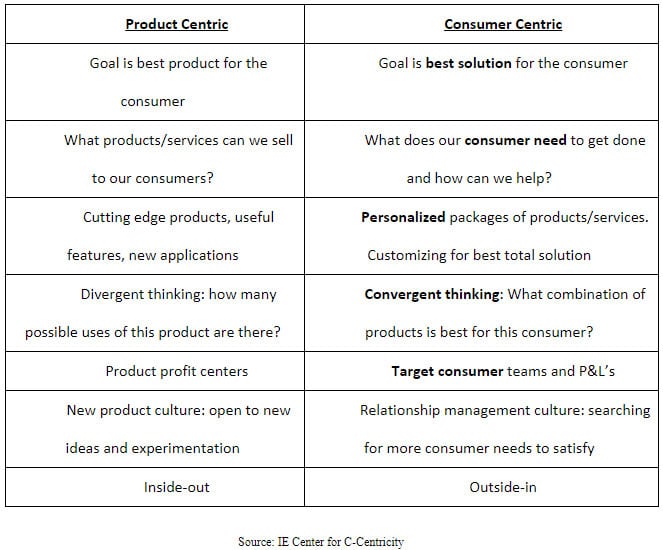Being the Leader of a Consumer-Centric Organization

In working and talking with senior leaders over the decades, I’ve learned that most senior executives say their companies are consumer centric. On the surface, there is evidence to support this thought. After all, most of these executives’ companies make products that are influenced by consumer insights and sell them to consumers, many of which seem loyal.
But upon further digging, what looks like consumer centricity is actually product centricity. And it makes sense: Many senior executives come from sales or financial backgrounds where the focus is on selling products and their job as senior executives is to deliver sales and profit. But in this pursuit of sales targets, overlaps, and answering quarterly to investors, many senior executives are too focused on growing the business so they neglect growing the brand or corporate consumer empathy. Again, it makes sense because the former shows more immediate results on which senior executives are judged, while the latter takes time to build and maintain. But there is no brand with enviable consumer loyalty, price inelasticity, and subsequent sales/profit that doesn’t have the culture of building consumer-centricity, empathy, and building the brand.
While the ultimate goal is to have a culture of consumer empathy, any company must start with being consumer centric before it can develop corporate empathy for the consumer. This is something that must start from the top down, not the bottom up. It’s hard to build a culture of any kind from the bottom up if it’s not championed by senior leadership. It’s perfectly okay if you don’t know everything about your consumer, only that you set the expectation that your companies and departments be consumer centric.
It’s hard to go on LinkedIn or read professional articles and not see quotes from Jeff Bezos or analyses of Amazon’s success. Most are centered around supply chain, pricing, product variety, and shipping/delivery, to name a few. But of all the stories, analyses, and examples I’ve seen, the one that explains Amazon’s success more than anything is the Bezos-led consumer obsession. Bezos even took the time during quarterly earnings reports to stress the non-quantifiable consumer centricity as the way Amazon will bring tremendous returns to investors:
“We intend to build the world’s most customer-centric company. We hold as axiomatic that customers are perceptive and smart, and that brand image follows reality and not the other way around…I constantly remind our employees to be afraid, to wake up every morning terrified. Not of our competition, but of our customers. Our customers have made our business what it is, they are the ones with whom we have a relationship, and they are the ones to whom we owe a great obligation. And we consider them to be loyal to us—right up until the second that someone else offers them a better service.
There are many ways to center a business. You can be competitor focused, you can be product focused, you can be technology focused, you can be business model focused, and there are more. But in my view, obsessive customer focus is by far the most protective of day one vitality.
If we can arrange things in such a way that our interests are aligned with our customers, then in the long term that will work out really well for customers and it will work out really well for Amazon.”
Do you recall the last time you put a stake in the ground like that? Have you stood up in front of your employees or investors and said the goal of your company is consumer centricity? If not, it will be difficult for your company to truly be consumer centric.
So what exactly does consumer centric mean? The best definition is from the IE Center for C-Centricity which calls it “a total company strategy that’s based on a deep understanding of consumers, is able to align the whole organization toward maximizing the consumer experience to drive sustainable growth.” This is different from being product centric, which in many cases, executives mistake for consumer centricity. Here’s a great comparison to determine if your company is consumer centric:

At first glance, the product-centric column can look very consumer centric. It takes the consumer into account in several areas. But the focus is still the product: the best product for the consumer, product profit centers, product features, etc. Most importantly, it’s an inside-out approach, which means the products are mostly top-down or internally directed, not the outside-in approach of the consumer centric column, which takes consumer solutions into account and involves the consumer every step of the way.
If you, as senior leaders, insist that the entire company take responsibility for the consumer, take the focus off the products, and work to create solutions that solve your consumers’ problems, you will be profitable.
If Amazon and other consumer-obsessed companies have proved anything, it’s that if you are consumer centric, the products, pricing, go-to-market strategy, operations, and ultimately profit all take shape around the consumer. To do otherwise keeps companies on the hamster wheel of constantly chasing short-term, unsustainable results. Yet reading through CEO’s remarks on scores of earnings calls raises the question of how many companies don’t have a consumer-centric culture that starts with the chief executives and instills throughout the organization.
Written by Brett Townsend, SVP of Strategy at Quester Strategy and Insights and Tim Hoskins, President of Quester.
Have you read?
Highest-Paid Athletes in the World.
Largest stock exchanges in the world by market capitalization.
Countries with the largest air forces in the world.
Best European destinations to travel to as a student.
Largest Cities in Africa.
Bring the best of the CEOWORLD magazine's global journalism to audiences in the United States and around the world. - Add CEOWORLD magazine to your Google News feed.
Follow CEOWORLD magazine headlines on: Google News, LinkedIn, Twitter, and Facebook.
Copyright 2025 The CEOWORLD magazine. All rights reserved. This material (and any extract from it) must not be copied, redistributed or placed on any website, without CEOWORLD magazine' prior written consent. For media queries, please contact: info@ceoworld.biz








